时间前介词
in、on、at关于时间用法
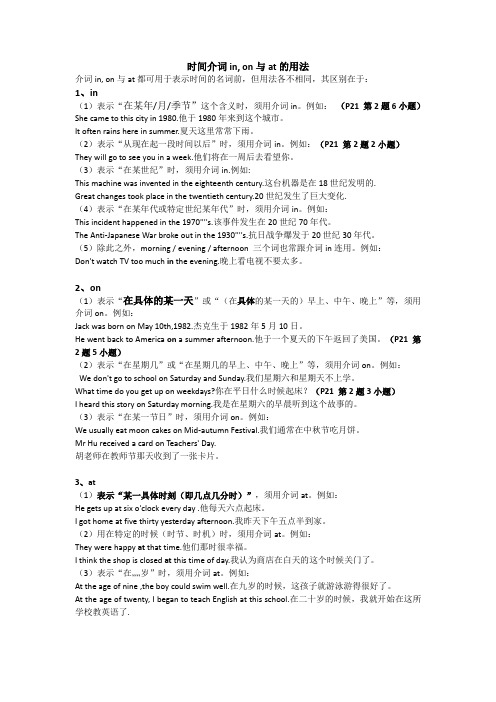
时间介词in, on与at的用法介词in, on与at都可用于表示时间的名词前,但用法各不相同,其区别在于:1、in(1)表示“在某年/月/季节”这个含义时,须用介词in。
例如:(P21 第2题6小题)She came to this city in 1980.他于1980年来到这个城市。
It often rains here in summer.夏天这里常常下雨。
(2)表示“从现在起一段时间以后”时,须用介词in。
例如:(P21 第2题2小题)They will go to see you in a week.他们将在一周后去看望你。
(3)表示“在某世纪”时,须用介词in.例如:This machine was invented in the eighteenth century.这台机器是在18世纪发明的.Great changes took place in the twentieth century.20世纪发生了巨大变化.(4)表示“在某年代或特定世纪某年代”时,须用介词in。
例如:This incident happened in the 1970''''s.该事件发生在20世纪70年代。
The Anti-Japanese War broke out in the 1930''''s.抗日战争爆发于20世纪30年代。
(5)除此之外,morning / evening / afternoon 三个词也常跟介词in连用。
例如:Don't watch TV too much in the evening.晚上看电视不要太多。
2、on(1)表示“在具体的某一天”或“(在具体的某一天的)早上、中午、晚上”等,须用介词on。
例如:Jack was born on May 10th,1982.杰克生于1982年5月10日。
He went back to America on a summer afternoon.他于一个夏天的下午返回了美国。
关于时间前的介词用法

关于时间前的介词用法1、介词in用法:2、介词at的用法:3、after 表示在什么时间之后。
4、其反义词是before 或ago 表示在什么时间之前5、介词on的用法:小学英语介词at,in与on在时间方面的用法at表示时间的一点;in表示一个时期;on表示特殊日子。
如:He goes to school at seven o’clock in the morning. 他早晨七点上学。
Can you finish the work in two days. 你能在两天内完成这个工作吗?Linda was born on the second of May. 琳达五月二日出生。
1>. at后常接几点几分,天明,中午,日出,日落,开始等。
如:at five o’clock (五点),at down (黎明),at daybreak (天亮),at sunrise (日出),at noon (中午),at sunset (日落),at midnight (半夜),at the beginning of the month (月初),at that time (那时)at that moment (那会儿),at this time of day (在一天的这个时候)。
2>. in后常接年,月,日期,上午,下午,晚上,白天,季节,世纪等。
如:in 2006(2006年),in May,2004 (2004年五月),in the morning (早晨/上午),in the afternoon (下午),in the evening (晚上),in the night (夜晚),in the daytime (白天),in the 21st century (21世纪),in three days (weeks/month)三天(周/个月),in a week (一周),in spring (春季)。
时间介词at,in,on

时间名词和介词的搭配in,at和on是时间名词前常用的介词,下面就它们在时间名词前如何使用进行详解。
一、on用于具体的某一天(上、下午和晚上)前。
在年份前用in,,月份前用in,年月前用in,季节前用in;在日前用on,月日前用on,年月日前用on,星期前用on,以Day结尾的节日前用on。
例:in 2008;in spring/summer/autumn/winter;in September;in September,2008;on September 10th;on September 10th,2003;on Monday/Tuesday;on Christmas Day;on Women’s Day;on National Day(在国庆节那天)二、morning,afternoon,evening前有this,that,next,last,tomorrow,yesterday等词限定时,则前面一律不用介词。
例:1The boy was later for class this morning.这个男孩今天早上上学迟到了。
2Last Wednesday Lucy didn’t go to school,because she was ill,上个星期三露西没上学,因为她生病了。
3I shall give a talk next Tuesday morning.下周二上午我要作报告。
4Tomorrow afternoon we are going to watch a football match,明天下午我们将看一场足球赛。
5There was an accident on this street that afternoon.那天下午在这条街上发生了一起车祸。
三、在时间点前常用介词at。
例:at six o’clock;at half past eight;at ten to nine;at a quarter pasteleven;at twelve twenty四、★其他情况。
时间介词 例句大全
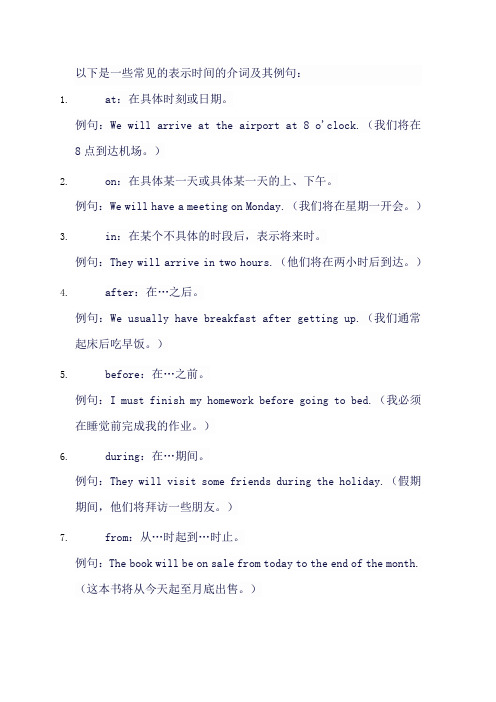
以下是一些常见的表示时间的介词及其例句:1.at:在具体时刻或日期。
例句:We will arrive at the airport at 8 o'clock.(我们将在8点到达机场。
)2.on:在具体某一天或具体某一天的上、下午。
例句:We will have a meeting on Monday.(我们将在星期一开会。
)3.in:在某个不具体的时段后,表示将来时。
例句:They will arrive in two hours.(他们将在两小时后到达。
)4.after:在…之后。
例句:We usually have breakfast after getting up.(我们通常起床后吃早饭。
)5.before:在…之前。
例句:I must finish my homework before going to bed.(我必须在睡觉前完成我的作业。
)6.during:在…期间。
例句:They will visit some friends during the holiday.(假期期间,他们将拜访一些朋友。
)7.from:从…时起到…时止。
例句:The book will be on sale from today to the end of the month.(这本书将从今天起至月底出售。
)8.since:自从…以来,表示过去时。
例句:I haven't seen him since last year.(自从去年以来我就没有见过他。
)9.through:一直到…时为止,表示过去时。
例句:We played basketball all through the summer.(整个夏天我们一直在打篮球。
)10.throughout:贯穿整个…期间,表示将来时。
例句:The project will run throughout the year.(该项目将贯穿全年。
)。
时间前面的介词
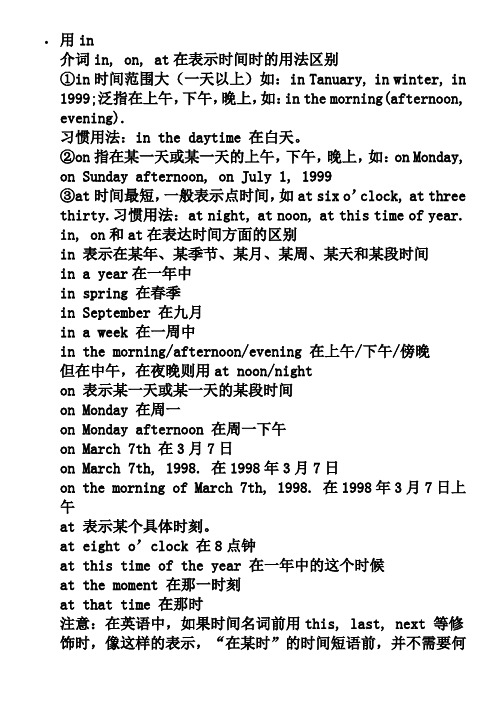
用in介词in, on, at在表示时间时的用法区别①in时间范围大(一天以上)如:in Tanuary, in winter, in1999;泛指在上午,下午,晚上,如:in the morning(afternoon, evening).习惯用法:in the daytime 在白天。
②on指在某一天或某一天的上午,下午,晚上,如:on Monday,on Sunday afternoon, on July 1, 1999③at时间最短,一般表示点时间,如at six o’clock, at threethirty.习惯用法:at night, at noon, at this time of year.in, on和at在表达时间方面的区别in 表示在某年、某季节、某月、某周、某天和某段时间in a year在一年中in spring 在春季in September 在九月in a week 在一周中in the morning/afternoon/evening 在上午/下午/傍晚但在中午,在夜晚则用at noon/nighton 表示某一天或某一天的某段时间on Monday 在周一on Monday afternoon 在周一下午on March 7th 在3月7日on March 7th, 1998. 在1998年3月7日on the morning of March 7th, 1998. 在1998年3月7日上午at 表示某个具体时刻。
at eight o’clock 在8点钟at this time of the year 在一年中的这个时候at the moment 在那一时刻at that time 在那时注意:在英语中,如果时间名词前用this, last, next 等修饰时,像这样的表示,“在某时”的时间短语前,并不需要何介词。
例如:last month, last week, this year, this week, next year, the next day, the next year等。
时间前面介词的用法

时间前面介词的用法
在时间前面,通常会使用以下介词:
1. at:用于具体的时刻或准确的时间点,例如at 8 o'clock(在8点钟),at noon(在中午)。
2. in:用于表示年、月、季节、十年,以及大部分情况下的某个段时间,例如in 2022(在
2022年),in May(在五月),in winter(在冬天),in the 1990s(在20世纪90年代)。
3. on:用于特定的日期、周几、假日以及某些节日,例如on January 1st(在1月1日),on Saturday(在星期六),on Christmas Day(在圣诞节)。
4. before:表示在某时间之前,例如before 9 am(在早上9点之前)。
5. after:表示在某时间之后,例如after 6 pm(在晚上6点之后)。
6. during:表示在某个期间或事件发生期间,例如during the summer(在夏天期间)。
7. until/till:表示一直到某个时间,例如until/till tomorrow(直到明天)。
需要注意的是,具体使用哪个介词取决于具体的时间表达方式,有时也需要根据上下文来确定。
常见介词及其用法
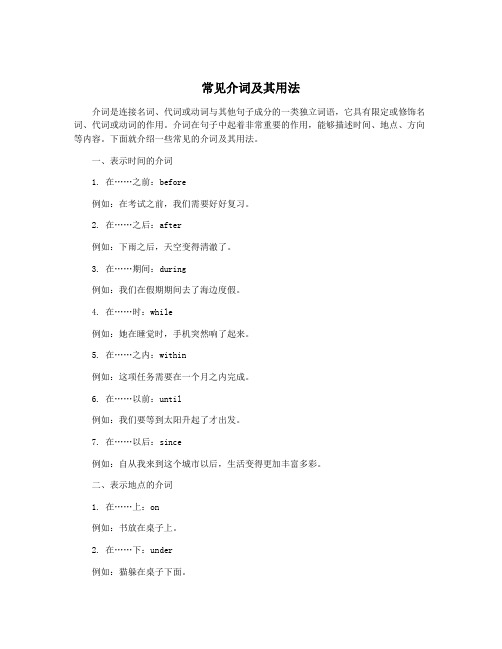
常见介词及其用法介词是连接名词、代词或动词与其他句子成分的一类独立词语,它具有限定或修饰名词、代词或动词的作用。
介词在句子中起着非常重要的作用,能够描述时间、地点、方向等内容。
下面就介绍一些常见的介词及其用法。
一、表示时间的介词1. 在……之前:before例如:在考试之前,我们需要好好复习。
2. 在……之后:after例如:下雨之后,天空变得清澈了。
3. 在……期间:during例如:我们在假期期间去了海边度假。
4. 在……时:while例如:她在睡觉时,手机突然响了起来。
5. 在……之内:within例如:这项任务需要在一个月之内完成。
6. 在……以前:until例如:我们要等到太阳升起了才出发。
7. 在……以后:since例如:自从我来到这个城市以后,生活变得更加丰富多彩。
二、表示地点的介词1. 在……上:on例如:书放在桌子上。
2. 在……下:under例如:猫躲在桌子下面。
3. 在……前面:in front of例如:他站在门的前面。
4. 在……后面:behind例如:她藏在树后面。
5. 在……旁边:beside例如:小狗躺在主人的脚旁边。
6. 在……里面:inside例如:汽车就停在院子里面。
7. 在……之间:between例如:两座山之间有一条小溪。
8. 在……周围:around例如:猫围着围巾打盹。
三、表示方式、原因等的介词1. 以……方式:in例如:她以勤奋的方式工作。
2. 因为:because of例如:他因为生病而没有来上班。
3. 由于:due to例如:由于天气原因,比赛被取消了。
4. 为了:for the sake of例如:他们为了儿子的教育离开了这个城市。
四、其他常见介词1. 当……时:when例如:当我看到她微笑的时候,我觉得很开心。
2. 因为……所以:because of例如:因为下雨,所以他取消了出行计划。
3. 尽管:despite例如:尽管天气很冷,他还是坚持去晨跑。
时间介词_at_in_on_用法及练习
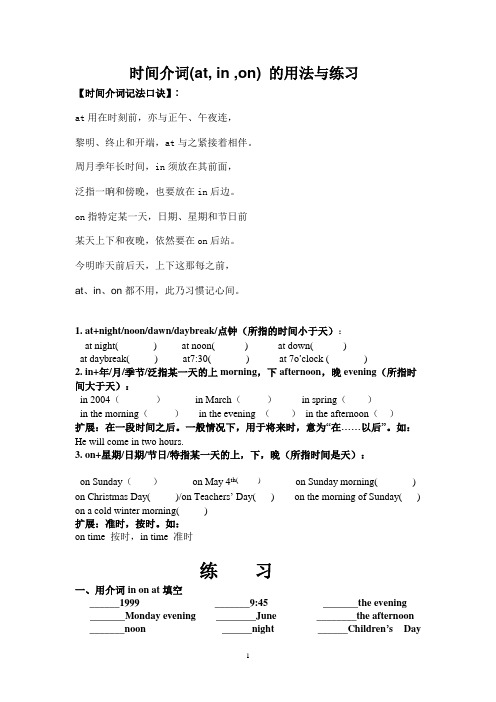
时间介词(at, in ,on) 的用法与练习【时间介词记法口诀】:at用在时刻前,亦与正午、午夜连,黎明、终止和开端,at与之紧接着相伴。
周月季年长时间,in须放在其前面,泛指一晌和傍晚,也要放在in后边。
on指特定某一天,日期、星期和节日前某天上下和夜晚,依然要在on后站。
今明昨天前后天,上下这那每之前,at、in、on都不用,此乃习惯记心间。
1. at+night/noon/dawn/daybreak/点钟(所指的时间小于天):at night( ) at noon( ) at down( )at daybreak( ) at7:30( ) at 7o’clock ( )2. in+年/月/季节/泛指某一天的上morning,下afternoon,晚evening(所指时间大于天):in 2004()in March()in spring()in the morning()in the evening ()in the afternoon()扩展:在一段时间之后。
一般情况下,用于将来时,意为“在……以后”。
如:He will come in two hours.3. on+星期/日期/节日/特指某一天的上,下,晚(所指时间是天):on Sunday()on May 4th( )on Sunday morning( ) on Christmas Day( )/on Teachers’ Day( ) on the morning of Sunday( ) on a cold winter morning( )扩展:准时,按时。
如:on time 按时,in time 准时练习一、用介词in on at填空______1999 _______9:45 _______the evening _______Monday evening ________June ________the afternoon _______noon ______night ______Children’s Day______Teachers’Day _______8 o’clock _______Summer_______May ______May,1999 ________May15th,1999 二、单选( ) 1. Children get gifts ____ Christmas(圣诞节) and ____ their birthdays.A. on; onB. at; onC. in; inD. in; on( ) 2.----There is nothing ____tomorrow afternoon, is there? -----No. We can have a game of table tennis.A. onB. inC. outD. up( ) 3. A lot of students in our school were born____March, 1981.A. inB. atC. onD. since( ) 4. He suddenly returned____ a rainy night.A. onB. atC. inD. during( ) 5. My grandfather was born____Oct. 10, 1935.A. onB. inC. atD. of( ) 6. The train is starting___five minutes.A. inB. atC. forD.still( ) 7. Mike does his exercises ____ seven _____ the evening.A. on; toB. at; inC. by; ofD. at; on( ) 8. Children wake up very early____the morning of Christmas Day.A. inB. onC. forD. at( ) 9 ____ a cold winter morning, I met her in the stfeet.A. InB. OnC. AtD. For( ) 10 It happened to be very cold____ the morning of our sports meeting.A. atB. onC. withD. of( ) 11. Why did you get up so early ___ this morning.A. onB. /C. atD. in( ) 12. He went to Shanghai___ September 3, 1991 and came back___ a cold morning last year.A. in; onB. on; inC. on; onD. in; ia( ) 13. Lucy was born____ the night of May 12, 1984. . ...A. onB. inC. atD. to( ) 14. Mrs Brown came to China ____ 1996.A.onB. ofC. to,D. in( ) 15 ___ the morning of November 20, 1915, the workers came to Chicago to show their mourning of Joe Hill.A. OnB. InC. OnD. At( ) 16. Ann moved___Hangzhou___September, 1992.A. /; inB. to; inC. to; on D, in; in( ) 17. They started off___an autumn afternoon.A. duringB. atC. inD. on( ) 18. He often goes ____ school ____ six thirty ____ the morning.A. for; to; inB. to; at; inC. to; for; at D, for; at; to( ) 19. He arrived ___ Shanghai ___ 9: 30 ___ March 5. A. at; in; at B. to; on; at C. in; on; at D. in; at; on( ) 20.The English teacher told me to get there____ half past ten.A: in B. at C. on D. of基数词与序数词专项练习一、知识归纳①基数词变序数词的规律:口诀:基变序,有规律,结尾加上th。
时间前面的介词使用小结

∙时间名词前所用介词的速记歌∙年月周前要用in,日子前面却不行。
∙遇到几号要用on,上午下午又是in。
∙要说某日上下午,用on换in才能行。
∙午夜黄昏须用at,黎明用它也不错。
∙at也用在明分前,说“差”可要用上to,∙说“过”只可使用past,多说多练牢牢记,∙莫让岁月空蹉跎。
∙下面就时间概念的介词用法做一简要介绍和比较。
∙1.at表示时间概念的某一个点。
(在某时刻、时间、阶段等)。
∙at 1:00(dawn,midnight,noon)在一点钟(黎明、午夜、中午)∙these are our chief tasks at the present stage.这些就是我们现阶段的主要任务。
∙2.on∙1)表示具体日期。
∙they arrived in shanghai on may∙25.他们在五月二十五日到达上海。
∙1)关于"在周末"的几种表示法:∙at(on)the weekend---特指∙at(on)weekends---泛指∙over the weekend∙during the weekend∙(2)在圣诞节,应说"at christmas"on christmas∙2)在(刚……)的时候。
∙on reaching the city he called up his parents.一到城里他就给父母打了一个电话。
∙3.in∙1)表示"时段"、"时期",在多数情况下可以和dur- ing互换,前者强调对比,后者强调持续。
in(during)1988(december,the 20th century)在一九八八年(十二月、二十世纪)∙i returned to beijing in the middle of june.我是六月中回北京的。
但如果表示"在某项活动的期间",则只能用during。
精确到年月日的介词
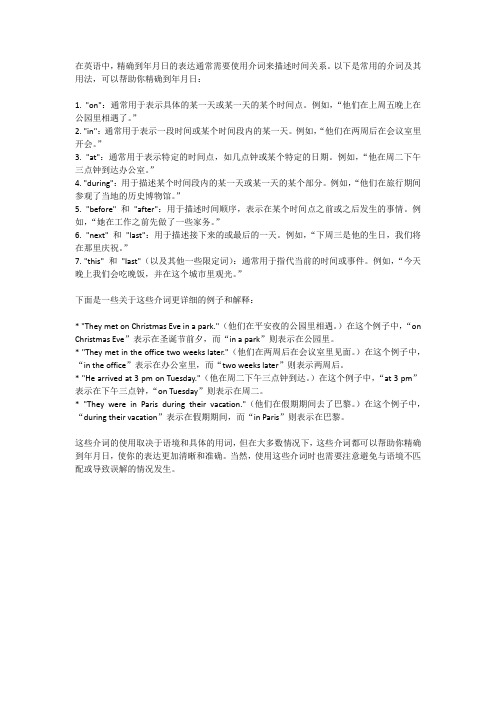
在英语中,精确到年月日的表达通常需要使用介词来描述时间关系。
以下是常用的介词及其用法,可以帮助你精确到年月日:1. "on":通常用于表示具体的某一天或某一天的某个时间点。
例如,“他们在上周五晚上在公园里相遇了。
”2. "in":通常用于表示一段时间或某个时间段内的某一天。
例如,“他们在两周后在会议室里开会。
”3. "at":通常用于表示特定的时间点,如几点钟或某个特定的日期。
例如,“他在周二下午三点钟到达办公室。
”4. "during":用于描述某个时间段内的某一天或某一天的某个部分。
例如,“他们在旅行期间参观了当地的历史博物馆。
”5. "before" 和"after":用于描述时间顺序,表示在某个时间点之前或之后发生的事情。
例如,“她在工作之前先做了一些家务。
”6. "next" 和"last":用于描述接下来的或最后的一天。
例如,“下周三是他的生日,我们将在那里庆祝。
”7. "this" 和"last"(以及其他一些限定词):通常用于指代当前的时间或事件。
例如,“今天晚上我们会吃晚饭,并在这个城市里观光。
”下面是一些关于这些介词更详细的例子和解释:* "They met on Christmas Eve in a park."(他们在平安夜的公园里相遇。
)在这个例子中,“on Christmas Eve”表示在圣诞节前夕,而“in a park”则表示在公园里。
* "They met in the office two weeks later."(他们在两周后在会议室里见面。
)在这个例子中,“in the office”表示在办公室里,而“two weeks later”则表示两周后。
英语中时间名词前介词的用法
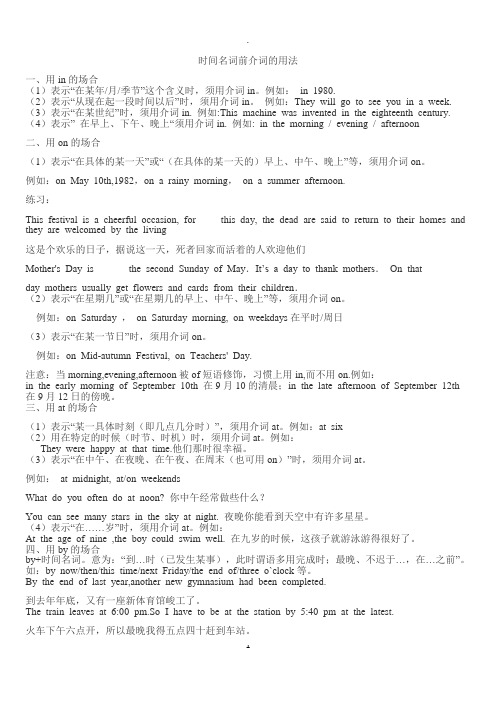
时间名词前介词的用法一、用in的场合(1)表示“在某年/月/季节”这个含义时,须用介词in。
例如:in 1980.(2)表示“从现在起一段时间以后”时,须用介词in。
例如:They will go to see you in a week. (3)表示“在某世纪”时,须用介词in. 例如:This machine was invented in the eighteenth century. (4)表示” 在早上、下午、晚上“须用介词in. 例如: in the morning / evening / afternoon二、用on的场合(1)表示“在具体的某一天”或“(在具体的某一天的)早上、中午、晚上”等,须用介词on。
例如:on May 10th,1982,on a rainy morning,on a summer afternoon.练习:This festival is a cheerful occasion, for ____this day, the dead are said to return to their homes and they are welcomed by the living这是个欢乐的日子,据说这一天,死者回家而活着的人欢迎他们Mother's Day is ______the second Sunday of May.It’s a day to thank mothers.On thatday mothers usually get flowers and cards from their children.(2)表示“在星期几”或“在星期几的早上、中午、晚上”等,须用介词on。
例如:on Saturday ,on Saturday morning, on weekdays在平时/周日(3)表示“在某一节日”时,须用介词on。
例如:on Mid-autumn Festival, on Teachers' Day.注意:当morning,evening,afternoon被of短语修饰,习惯上用in,而不用on.例如:in the early morning of September 10th 在9月10的清晨;in the late afternoon of September 12th 在9月12日的傍晚。
关于时间前的介词用法浅析

关于时间前的介词用法浅析作者:尹志远来源:《初中生(三年级)》2006年第03期1.在某年、某季节、某月、某世纪的年代等固定短语前用介词 in。
如:in 1995,in spring,in October,in the 1990’s (在20世纪90年代 ),in the morning,in the afternoon,in the evening...2.在某日,星期几,(某年)某月某日,特定的早上、下午、晚上,或有修饰语的时间前用 on。
如:on the third,on Monday,on July 1,(1921),on the morning of June 1,on Saturday afternoon,on the early summer,on the late afternoon...3.在几点钟和一些固定短语中,用介词“at”。
如:at eight,at noon,at night...4.表示“在……之后”,介词 in 用于将来时,介词after 多用于过去时,也可用于其他时态。
如:He’ll be back in an hour.他一个小时后回来。
After seven the rain began to fall.雨是7点钟以后开始下的。
5.表示“直到……为止”,用介词 till 或 until。
如:till last week,until yesterday...6.表示一段时间,用介词 for。
如:I have been in Beijing for four years.我在北京呆了四年。
Is it all right if I use it for a minute? 我能使用一下它吗?●练一练:1.—What time did you get there this morning?—______eight.A.In B.On C.At D.From(2003北京市)2.We traveled overnight to Paris and arrived______5 o’clockthe morn ing.A.on,inB.at,inC.at,onD.in,on(2003山西省)3.Mary is flying to France soon. She will arrive______Paris______the morning of July 9. A.in,onB.at,inC.in,in D.at,on(2003广州市)4.—When will Mr. Black come to Beijng?—______September 5.A.OnB.ToC.At D.In(2004北京市)5.The twins were born______a Friday evening.A.inB.at C.on D.of(2004吉林省)6.We went to the country______a very cold morning.A.atB.in C.on(2004武汉市)7.My father will be back from Beijing______a week.A.forB.in C.after(2004四川省)8.—How old are you?—I’m fifteen. I was born______1990.A.inB.at C.on D.for(2005北京市)9.The accident happened______a cold winter morning.A.inB.on C.at D.of(2005陕西省)10.I will meet my best friend______the morning of May 1st.A.inB.on C.at(2005青海省)11.I was bornJuly 2,and my birthday is coming soon.A.onB.in C.at D.from(2005常德市)12.______8∶00 of August 8,2008,Beijing will hold the 29th Olympic Games.A.AtB.In C.OnD.By(2005甘肃省)Key:1.C 2.B 3.A 4.A 5.C 6.C 7.B 8.A 9.B 10.B 11.A 12.A。
in ,on ,at介词表示时间

3、用at的时间短语有:
①午夜黄昏用at
at noon; at night;at midnight;at that time
②也可用在时分前
at ten o‘clock; at half past eight; at lunch / dinner time;at tea time
③说“差”可要用上to
at five to twelve ,a quarter to eleven 分针在左边
④ 说“过”只可past at ten past seven ;a quarter past eleven 分针在右边
• From……to……从几点到几点
• From 2pm to 6:20pm
• During 在……期间,强调从头到尾
• I enjoyed myself during the holiday. • In 表示某一个点 • I caught a cold in the holidy.
• Until 直到,强调动作终止点
in+表示时间长度可译为“……时间之后”,一般与将来 时连用。 in twenty minutes' time 20分钟之后 We will finish class in half an hour.
2、用on的时Байду номын сангаас短语有:
①周几几号要用on on Monday;on Friday, on that day, on June 1st;on 23rd March
时间介词in/on/at
口诀
年月周季要用in,上午下午又是in。 周几几号要用on,或者某日上下午。 午夜黄昏用at,也可用在时分前。 说“差”可要用上to,说“过”只可 past。
英语中时间名词前介词的用法

英语中时间名词前介词的用法(总2页)-CAL-FENGHAI.-(YICAI)-Company One1-CAL-本页仅作为文档封面,使用请直接删除时间名词前介词的用法一、用in的场合(1)表示“在某年/月/季节”这个含义时,须用介词in。
例如: in 1980.(2)表示“从现在起一段时间以后”时,须用介词in。
例如:They will go to see you in a week.(3)表示“在某世纪”时,须用介词in. 例如:This machine was invented in the eighteent h century.(4)表示” 在早上、下午、晚上“须用介词in. 例如: in the morning / evening / afterno on二、用on的场合(1)表示“在具体的某一天”或“(在具体的某一天的)早上、中午、晚上”等,须用介词o n。
例如:on May 10th,1982,on a rainy morning, on a summer afternoon.练习:This festival is a cheerful occasion, for ____this day, the dead are said to return t o their homes and they are welcomed by the living这是个欢乐的日子,据说这一天,死者回家而活着的人欢迎他们Mother's Day is ______the second Sunday of May.It’s a day to thank mothers. On tha tday mothers usually get flowers and cards from their children.(2)表示“在星期几”或“在星期几的早上、中午、晚上”等,须用介词on。
例如:on Saturday , on Saturday morning, on weekdays在平时/周日(3)表示“在某一节日”时,须用介词on。
介词in,on,at,to,past加时间速记口诀:

介词in / on / at / to / past 加时间速记口诀:年月周前要用in,日子前面却不行。
遇到几号要用on,上午下午又是in。
要说某日上下午,用on换in才能行。
午夜黄昏须用at,黎明用它也不错。
at也用在时分前,说“差”可要用上to。
说“过”只可使用past,
多说多练牢牢记,莫让岁月成蹉跎。
介词in / on / at / to / past 加时间速记口诀:年月周前要用in,日子前面却不行。
遇到几号要用on,上午下午又是in。
要说某日上下午,用on换in才能行。
午夜黄昏须用at,黎明用它也不错。
at也用在时分前,说“差”可要用上to。
说“过”只可使用past,
多说多练牢牢记,莫让岁月成蹉跎。
介词in / on / at / to / past 加时间速记口诀:年月周前要用in,日子前面却不行。
遇到几号要用on,上午下午又是in。
要说某日上下午,用on换in才能行。
午夜黄昏须用at,黎明用它也不错。
at也用在时分前,说“差”可要用上to。
说“过”只可使用past,
多说多练牢牢记,莫让岁月成蹉跎。
介词in / on / at / to / past 加时间速记口诀:年月周前要用in,日子前面却不行。
遇到几号要用on,上午下午又是in。
要说某日上下午,用on换in才能行。
午夜黄昏须用at,黎明用它也不错。
at也用在时分前,说“差”可要用上to。
说“过”只可使用past,
多说多练牢牢记,莫让岁月成蹉跎。
- 1、下载文档前请自行甄别文档内容的完整性,平台不提供额外的编辑、内容补充、找答案等附加服务。
- 2、"仅部分预览"的文档,不可在线预览部分如存在完整性等问题,可反馈申请退款(可完整预览的文档不适用该条件!)。
- 3、如文档侵犯您的权益,请联系客服反馈,我们会尽快为您处理(人工客服工作时间:9:00-18:30)。
3回答30island介词用on还是用in?.
2回答我很喜欢用“be + 感情形容词 + 介词”的用法,但同时也很纠结于介词....
0回答He has lived in France for five years.请问这里的介词FOR能用其他介....
5回答5在XX路左/右转,需不需要用介词on?例如:在第五大道右转。翻译:Turn....
3回答He lives in a village ________ the river.介词用什么.
2回答10用适当介词填空 What does that book look _____? It's time ____ bre...
on Christmas afternoon (圣诞节下午)
on October 1,1949 (1949年10月1日)
on New Year”s Day (新年)
on New Year”s Eve (除夕)
0
| 评论
等待您来回答
1回答什么时候英语定于从句必须要用 介词 + WH.
Linda was born on the second of May. Linda was born on the second of May.琳达五月二日出生。
1. at后常接几点几分,天明,中午,日出,日落,开始等。如:
at five o”clock (五点)
at down (黎明)
3. on后常接某日,星期几,某日或某周日的朝夕,节日等。如:
on Sunday (星期日)
on a warm morning in April (四月的一个温暖的上午)
on a December night (12月的一个夜晚)
on that afternoon (那天下午)
on the following n一天的这个时候)。
2. in后常接年,月,日期,上午,下午,晚上,白天,季节,世纪等。如:
in 2006(2006年)
in May,2004 (2004年五月)
in the morning (早晨/上午)
in the afternoon (下午)
at daybreak (天亮)
at sunrise (日出)
at noon (中午)
at sunset (日落)
at midnight (半夜)
at the beginning of the month (月初)
at that time (那时)
at that moment (那会儿)
in the evening (晚上)
in the night (夜晚)
in the daytime (白天)
in the 21st century (21世纪)
in three days (weeks/month)三天(周/个月)
in a week (一周)
in spring (春季)。
at表示时间的一点;in表示一个时期;on表示特殊日子。如:
He goes to school at seven o”clock in the morning. 他早晨七点上学。
Can you finish the work in two days. Can you finish the work in two days.你能在两天内完成这个工作吗?
